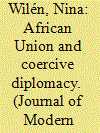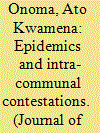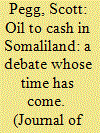| Srl | Item |
| 1 |
ID:
162482


|
|
|
|
|
| Summary/Abstract |
In December 2015, the African Union (AU) took the unprecedented step of threatening to use military force against the government of Burundi's wishes in order to protect civilians caught up in the country's intensifying domestic crisis. This article traces the background to this decision and analyses the effectiveness and credibility of the AU's use of coercive diplomacy as a tool of conflict management. After its usual range of conflict management tools failed to stem the Burundian crisis, the AU Commission and Peace and Security Council tried a new type of military compellence by invoking Article 4(h) of the Union's Constitutive Act. We argue that the threatened intervention never materialised because of (1) the Burundian government's astute diplomacy and (2) several African autocrats’ resistance to setting a precedent for future interventions where concerns about civilian protection might override state sovereignty.
|
|
|
|
|
|
|
|
|
|
|
|
|
|
|
|
| 2 |
ID:
162477


|
|
|
|
|
| Summary/Abstract |
Given the history of the International Criminal Court in Africa, the relationship between African states and the Court is particularly significant to its legitimacy. If the power of the Court is grounded in international political support and the perception that it transcends international and national politics to deny impunity for ‘atrocity’ crimes, the Court's perceived legitimacy and normative legitimacy are so intertwined that charges of illegitimacy from significant regional stakeholders hold particular weight. More importantly, criticisms voiced by African actors point to a valid challenge to the Court's legitimate moral standing as an arbiter of global justice: the international power imbalance that seems to be becoming more entrenched and apparent in the Court's work. Tactics adopted by some African leaders of prioritising the issue of heads-of-state immunity, however, minimise the broader issue of power differentials and reduce the chance that African states will find allies in their cause to challenge the Court's operations.
|
|
|
|
|
|
|
|
|
|
|
|
|
|
|
|
| 3 |
ID:
162479


|
|
|
|
|
| Summary/Abstract |
As the Ebola epidemic ravaged the Mano River Basin in 2014, there was concern in Senegal that the resident Peul community of Guinean origins will cause the spread of the disease to Senegal. These fears went unrealized as the Peul migrants embraced many of the epidemic control and prevention measures, which often distanced them from primordial publics in Guinea. While partly motivated by concern over the dangers of Ebola, Peul migrants embraced these measures also because the epidemic and measures advocated to curb it allowed them to assert greater autonomy in their often-fractious relations with primordial publics in their places of origin in Guinea. Their embrace of these measures suggests a rethink of the emphasis on intercommunal strife, intra-communal conviviality and trenchant state-society chasms, which pervades much work on the political economy of postcolonial Africa and which draws significant inspiration from the work of Peter Ekeh.
|
|
|
|
|
|
|
|
|
|
|
|
|
|
|
|
| 4 |
ID:
162480


|
|
|
|
|
| Summary/Abstract |
Somaliland might start producing oil in 2019. Yet, it has done little to prepare for the arrival of oil revenues which could exceed its current annual budget. Although Somaliland has been largely peaceful for two decades and recently inaugurated its fifth president after holding a democratic election, it remains entirely unrecognised. Oil revenues could positively transform Somaliland's fragile political economy, but they also place it at significant risk for a political resource curse that could threaten its democracy, peace and political institutions. Oil to cash or the direct distribution of oil revenues to citizens has been posited as a solution to the political resource curse. Somaliland has many of the elements necessary to make oil to cash work in place. Several factors combine to make Somaliland both potentially receptive to oil to cash and uniquely positioned to benefit from it. Interviews with political elites demonstrate receptiveness to the idea. Sample revenue calculations from other African oil producers highlight just how such a system could work to benefit Somaliland.
|
|
|
|
|
|
|
|
|
|
|
|
|
|
|
|
| 5 |
ID:
162481


|
|
|
|
|
| Summary/Abstract |
Boko Haram's operations and ideology have been the subject of increasing research in recent years. This article, in contrast, explores the culture of Boko Haram through an ethnographic analysis of the group's internal videos that were not intended for public release. The authors find that in their everyday lives Boko Haram foot soldiers are different from the image the group presents to the world in propaganda videos. While unmistakably a violent movement, in territories under the group's control that it attempted to administer, foot soldiers participated in conflict resolution with elders, explained the group's position on external alliances to villagers, engaged in recreation to pass time off the battlefield and created bonds of solidarity with other members of the group. Using insights from anthropology and the examination of ‘Jihadi Culture’, this article's insights help us understand how and why Boko Haram foot soldiers fight beyond the group's public ideology or stated goals: for many of them, it is simply a lifestyle.
|
|
|
|
|
|
|
|
|
|
|
|
|
|
|
|
| 6 |
ID:
162478


|
|
|
|
|
| Summary/Abstract |
The rapid and massive adoption of mobile money transfer (MMT) services in East Africa, particularly in Kenya, stands in stark contrast to historically low use of formal financial systems on the continent. Its ‘fertile grounds’ therefore require in-depth analysis to understand the implications for African financial systems. This paper argues for the need to examine the underlying conceptual environment that enables low income and poor people's MMT adoption. It innovatively combines anthropological with ethnolinguistic analytical approaches to distinguish two repertoires around resource exchange. First, is a relational financial repertoire where relationships are developed and consolidated to create support and ‘upliftment’. A contrasting resource-focused repertoire is more like that of the formal financial sector. Identifying the conceptual features of relationality, the study offers a new perspective on the adoption and use of MMT in Africa and highlights the potential for disjunctures with policy efforts to increase financial inclusion.
|
|
|
|
|
|
|
|
|
|
|
|
|
|
|
|